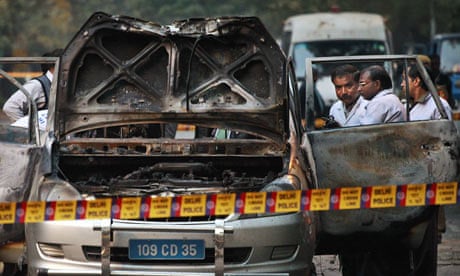Indian police have said a bomb attack that wounded an Israeli diplomat's wife in New Delhi last month is connected to a series of explosions in Bangkok on the same day.
Israel has accused Iran of orchestrating those plots as well as a failed bombing in the former Soviet republic of Georgia, all of which were suspected of targeting Israeli diplomats. Iran has denied any involvement.
Indian authorities had previously declined to implicate Iran in the New Delhi attack on 13 February that wounded the diplomat's wife and three others with a bomb attached to her car by a magnet. However, they said the investigation is increasingly centering on Iranians and people with ties to Iran.
Last week, police arrested an Indian freelance journalist who reportedly worked for Iranian news organisations. Earlier this week, they issued arrest warrants for three Iranian men who had left the country.
Delhi police commissioner BK Gupta told reporters that one of those three men, Housan Afshar, had been in contact with Masoud Sedaghatzadeh, who was earlier arrested in Malaysia and accused of involvement in the Bangkok blast.
On Saturday, a Delhi court issued an arrest warrant for Sedaghatzadeh for suspected involvement in the Delhi blast. Police will seek to have him extradited from Malaysia, the Press Trust of India news agency said.
India is asking Interpol for assistance in finding and extraditing the men, according to foreign ministry spokesman Syed Akbaruddin.
"We have informed the Iranian ambassador of these developments so as to seek the co-operation of the Iranian authorities in bringing those involved in this dastardly attack to justice," he said in a statement.
Police accused Sedaghatzadeh of being the operational head of the group that was planning the Bangkok attacks and said his arrest in Malaysia led them to Afshar. Gupta said police found that Afshar and the Indian journalist, Syed Mohammed Kazmi, had been in telephone contact.
Police said the Iranians had performed reconnaissance at the Israeli Embassy last May before returning to Delhi in January and February to plan the attack. Two of the three suspects left India before the attack and the third left shortly afterward, police said. Gupta said Kazmi was deeply involved in the reconnaissance.
"He has been arrested as a facilitator and for being a part of the conspiracy. His questioning brought to light that he has been in contact with persons of Iranian origin involved in the attack for some time," Gupta told reporters.
He said Kazmi told police he went to Iran twice last year, promised to provide assistance to the attackers in India and was paid $5,500 (£3,470). In addition to helping with surveillance of the embassy, Kazmi booked a plane ticket for one of the Iranian suspects to leave the country, Gupta said.
A scooter used by Kazmi and Afshar for reconnaissance near the Israeli embassy was found parked at Kazmi's home. Police were also investigating the source of nearly $45,600 in remittances from abroad in Kazmi's and his wife's bank accounts, a Delhi police statement said.
